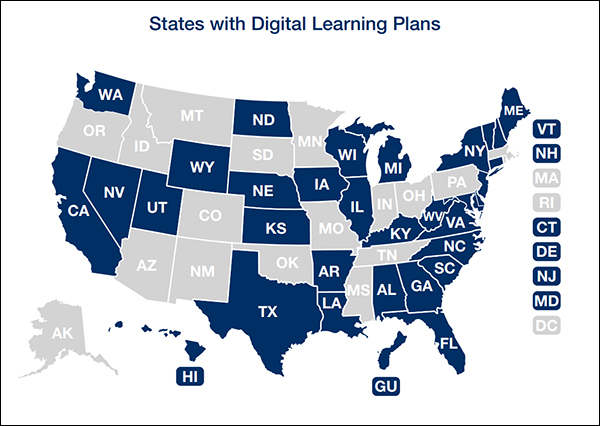States Are Playing a Bigger Role in Digital Instruction, Survey Finds
Professional learning to help K-12 educators choose and implement digital instructional materials is being offered by nearly half the states, according to a new report from the State Educational Technology Directors Association (SETDA).
While 32 states (those in blue on the map above) have developed digital learning plans, 19 mandate that districts develop their own digital learning plans.
Nine states require that students take at least one online course before graduating high school, and three states—Arkansas, North Carolina, and West Virginia—require that digital instructional materials be implemented.
These findings are among the discoveries SETDA made as it updated its database that maps state acquisition policies for digital instructional materials. The portal is a free resource with information for educators, district leaders, policymakers, and companies. The organization’s new report is called State K12 Instructional Materials Leadership Trends Snapshot.
“This is the first time we asked anything about professional development,” said Christine Fox, SETDA’s deputy executive director. “We did so because states were asking us about it.”
“You can have great professional materials, but if you don’t know how to use them effectively, or make great choices on how to implement them, it’s like having a Ferrari but not knowing how to drive stick shift,” she said.
SETDA found that:
- 25 states provide professional learning around accessibility for districts;
- 22 states offer PD around the selection of digital instructional materials; and,
- 21 states provide professional learning about the implementation of digital materials.
For companies, Fox said it’s worth noting that states that have a review process for instructional materials are providing more flexibility to districts to make their own choices.
“Only a couple of states require those materials without an ‘opt-out’ option,” said Fox. “Nevada requires it right now, and is in the process of changing it,” said Fox, adding that the state will be adopting the model used in Louisiana. There, the state ranks materials with high, medium, or low ratings. Districts can choose materials not on the list, but they must go through the same review process used for the state’s adoption list.
West Virginia won’t be reviewing materials after July 1, but will provide training and recommendations on how to review them, Fox said.
Personalized Learning, OER, More
This year was also the first time SETDA asked whether states have a definition of personalized learning. Ten do, and “I’m guessing there will be an uptick in that number,” Fox said.
Many states are working on personalized learning, and the work done by the first ones to define it could help others interested in doing the same, she said.
More states than ever—38—have definitions of digital instructional materials. A record number (21) is defining open educational resources (OER), up from nine in 2015. Most states are not creating their own OER, she said, but they have it on their radar from the #GoOpen initiative launched by the last administration. (Some in the ed-tech industry objected to the messaging of that campaign a few years ago.)
The nine states that now require completion of one online course before high school graduation are: Alabama, Arkansas, Georgia, Florida, Michigan, Missouri, Nevada, Utah, and Virginia.
Those interested in learning about states’ latest procurement policies, review processes, and more, can access them from SETDA’s Digital Instructional Materials, Acquisition Policies for States site.
Image: A SETDA survey found that 32 states (those in blue) have developed a digital learning plan. (Courtesy SETDA)
Follow EdWeek Market Brief on Twitter @EdMarketBrief or connect with us on LinkedIn.
See also:


Remuneration that smooths out the harsh fixes in this on-request work life, however, such endeavors will fall behind the misuse of said work in light of the fact that huge business has more assets and huge tech moves unreasonably quick for human-scale reactions of accountability and responsibility. Assignment land